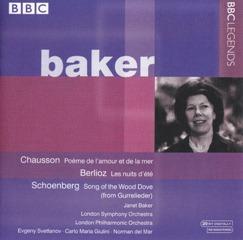Janet Baker – Sings Chausson Berlioz Schoenberg (2001)
Janet Baker – Sings Chausson Berlioz Schoenberg (2001)

Chausson - Poeme de l'amour et de la mer (Poem of Love and of the Sea), Op. 19 1. No. 1. La fleur des eaux 12:08 2. No. 2. Interlude 2:28 3. No. 3. La mort de l'amour: Le temps des lilas 13:23 Berlioz - Les nuits d'ete, Op. 7 4. Les nuits d'ete, Op. 7: No. 1. Villanelle 2:29 5. Les nuits d'ete, Op. 7: No. 2. Le Spectre de la rose 8:21 6. Les nuits d'ete, Op. 7: No. 3. Sur les lagunes 6:10 7. Les nuits d'ete, Op. 7: No. 4. Absence 6:21 8. Les nuits d'ete, Op. 7: No. 5. Au cimetiere 5:20 9. Les nuits d'ete, Op. 7: No. 6. L'Ile inconnue 4:25 Scoenberg - Gurre-Lieder, Part I 10. Tauben von Gurre! Sorge qualt mich, "Song of the Wood Dove" 13:47 Janet Baker – mezzo-soprano London Philharmonic Orchestra (4-9) London Symphony Orchestra (1-3, 10) Carlo Maria Giulini – conductor (4-9) Evgeny Svetlanov – conductor (1-3) Norman del Mar – conductor (10)
When Berlioz wrote Les nuits d'ete he set it for voice and piano, the voice being mezzo-soprano or tenor, but when he orchestrated it 15 years later a variety of voices was his choice. There have been few recordings with more than one singer.Janet Baker recorded the cycle for EMI and Virgin, the latter late in her career. The former, with Barbirolli conducting, is a performance of many virtues, rivalling the first version that I obtained: Eleanor Steber's. The present one is from 1975, between the two mentioned above. How well she sings 'Le spectre de la rose', with long-breathed phrases, the final stanza ending exquisitely as she pares down her tone. Then a markedly different colour for the first line of the following song, 'Sur les lagunes', as she sings of the loved one being dead. The darkness of tone well conveys the bitterness: a splendid interpretation, with Giulini complementing the singer's intensity and subtlety, taking a slow journey through the work. 'Absence' is equally sensitive, the separation achingly real. This deserves to be placed alongside Baker's recording with Barbirolli, both better than the one with Hickox.The Chausson Poeme (previously issued on BBC Radio Classics) presents the voice in rather diffused sound, not ideally focused, as though set back. Baker is her usual committed self, bringing, as Alan Blyth writes in his note, variations of vocal colouring. The voice rattles a little when pressure is applied at full volume, but Baker certainly covers the range from passionate outpouring to delicacy. I would have enjoyed it more in a cleaner recording.Some years earlier, Baker sang the 'Song of the Wood Dove', and in what good voice she is, low notes rich and firm. I do not want to overuse the word, but Baker really was an intense singer. This is a dramatic scene, to which she brings gripping concentration. Magnificent. Though all three concerts were given in the Royal Festival Hall, the sound is variable. The Berlioz and Chausson were only a month apart, but the voice comes across more clearly, more focused, in the former. The Schoenberg has the best sound. That and Les nuits d'ete are strongly recommended. ---John T. Hughes, International Record Review
download (mp3 @320 kbs):
uploaded yandex 4shared mega solidfiles zalivalka cloudmailru filecloudio oboom uplea








